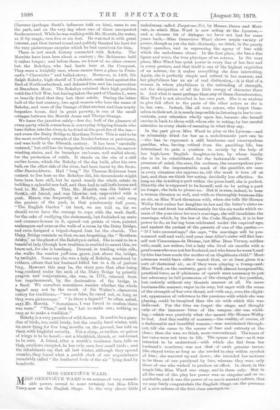MISS GENEVItVE WARD.
HISS GENEVIEVE WARD is an. actress of very remark. able power,. second to none certainly, but Miss Ellen Terrynow on the. English Stage. In the very clever 'little melodrama called Forget-me-Not, by Messrs. Grove and Mori-
vale, in which Miss Ward is now acting at the Lyceum,— and a cleverer bit of dialogue we have not had for some years back,—Miss Genevibve Ward shows ample variety of power, though as yet she fails distinetly, we think, in the purely tragic speeches, and in expressing the agony of fear with which the melodrama closes. Ia the first' place, she has a fine figure and voice, the true physique of an actress, In the next place, Miss Ward has quiet power in every line of her face and in every gesture, and that itself is one of the highest requisites of an actress, for it makes everything she doe interesting. Again, she is perfectly simple and refined in her manner, and her playfulness has an air of real dintinctiona—it is that of a woman in whom playfUlness is the unbending of strength, not the dissipation of all the little energy of character there
is. And what is mere-perhaps-than.anyof these charaoteristies,
Miss Ward is not absorbed in her own part. She is as anxious to give full effect to the parts of the other actors as she is
to her own, indeed, like all true actors, who forget them- selves in their art, it is nearly impossible in listening to her to con- centrata your attention wholly upon her, because she herself carries it .back, toi those with, whom she is acting, by her' careful attention to every shade of meaning in what they say.
In the part given Miss Ward to play at the Lyceum—and as admirably fitted for her as a melodramatic part can be —she has to represent a still handsome and unscrupulous gambler, who, having retired from the gambling life, has determined to gain, a position in society by the help of her highborn English daughter-in-law, by whose family she is to be rehabilitated for the fashionable world. The presenee,of mind, the ease, the coolness, the unscrupulous par- pose, and, the impenetrable mask of the gambler, are seen
in every situation she appears in, till the mask is torn off at last, and than we,think her acting decidedly less effective. So
long as she is acting apart within the piece itself, she is perfect.
Directly she is supposed to be herself, and to be acting a part no longer, she fails to please.us: But it is rare, indeed, to hear
a woman threaten so well, and with so thoroughly business-like an air, as Miss Ward :threatens with, when she tells Sir Horace Welby that unless her daughter-in-law and the latter's sister re- eeive her and treat her affectionately for the six weeks which re. main of the year since her son's marriage, she will invalidate the marriage, which, by the. law of the Code Napoleon, it is in her power to do, as having been celebrated under the required age, and against the protest of the parents of one of the parties :— "if I takeproceedinge," she says, "the marriage will be pro- nounced null and void, and your dear Alice's sister will find her-
self nob Yiseountess,de Mime, but Miss Rose-Verney, neither, wife, maid, nor widow, but a- lady who lived six months with a -
gentleman who.was not her husband, and who knew-he wasn't, and by him has-been' made the mother of an illegitimate child." Most actresses would- have either ranted that, or , at least given it a-
sort of rhetorical air, as if ' they. were playing a trump-card.
Miss-Ward, on the contrary, gave it with almost inexpressible, practical force, as if plainness of speech were necessary to put her adversary in full possession of the strength of her position, but entirely without any theatrie manner at all. No more business-like manner, eager in its way, but eager with the sense
of the, strength of 'her. own threat, not with any, eveuthe slight- est, appearance of 'reference to the-passions' with whioh she-was playing,, could be imagined than the- air with. which this was delivered. For the time we- forgot the stage, and, thought
only of the immense fOree of the. weapon she. was wield- ing,—whieli was precisely what she meant. Sir Horses Welby to feel. And this reality of manner,--the' reality, of course, of
a fashionable and beautiful woman,—was maintained' through- out, till' she came to the scenes of fear and entreaty at the
close ; then she was, we think, more conventional. The tones of
her voice were not true to, life. The spasm of fear—as it was intended to be understood—with which she fled, from her
husband'e murderer, was not that of swift genuine terror.
She stayed twice as long as she needed to stay within eyeshot of him ; she wavered up and down ; she. intended her motions
to be those of one paralysed by fear, whereas they were only those of one who wished to produce au efibet. In short, in the tragic bits; Miss Ward was stagy, and in them only. But in
all the rest of the play her power was so singular and so re- markable, and it was the power of BO much' mental culture, that we may fairly congratulate the English Stage on the presenee of a now actress of the first class amongst us.






























 Previous page
Previous page